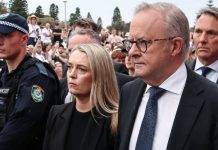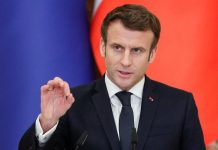DM Monitoring
TEL AVIV: As Israeli politicians battled to unseat long-term Prime Minister Benjamin Netanyahu, Palestinians in the occupied territories watched the struggle as another tragicomedy. For them, nothing will change given that opposition leaders hold the same anti-Palestinian stance as the current head.
The clock was ticking as former TV presenter Yair Lapid together with right-wing religious-nationalist Naftali Bennett tried to form an alternative governing alliance Wednesday to bring down the right-wing leader known as Bibi.
Bibi, who has ruled Israel for the past 12 years as the head of the country, managed to stay in the office after numerous elections – each ending in deadlock. His struggle to remain in power was marred by a corruption trial that lasted for more than two years with the prime minister facing corruption charges in bribery cases. The fourth inconclusive election in two years was no different, resulting in a political deadlock and Netanyahu remaining in his post with instructions from Israeli President Reuven Rivlin to form a new coalition government. Bibi’s hold on power has been hanging by a thread of late. He could hardly fulfill the task he had received as the voices of opposition leaders grew louder, and a touch more indignant, as his policies were even criticized by former allies. As Netanyahu failed, Rivlin tasked Lapid to form a new government. Bibi’s position was weakening by the day while the protests against his rule maintained their momentum. Israelis staged protests near his Jerusalem residence on many occasions, demanding his resignation. “Netanyahu’s popularity has waned and the people are tired of inconclusive elections. Likud dropped from 36 seats in March 2020 to 30 in March 2021,” Micheline Ishay, director of the human rights program at the University of Denver told Qatar-based media outlet Al-Jazeera. “Netanyahu’s relentless efforts to avoid prosecution, the split of right-wing parties, and a lingering pandemic have contributed to widespread disenchantment.”
But everything changed in May this year. From a leader-that-no-one-wants Netanyahu became the voice of Israeli aggression in the Gaza Strip. Once again the Palestinians have become the target of the practice of starting an armed conflict to divert attention from the political crisis in the country.
Raids on worshippers at the Al-Aqsa Mosque compound, where hundreds of Palestinians were assaulted by Israeli forces, as well as forced expulsion of Palestinian families from their homes in East Jerusalem’s Sheikh Jarrah neighborhood were just the first steps in a mass destruction campaign. Days of violence and brutality were swiftly followed by the bombardment of Gaza. Israeli airstrikes killed hundreds of Palestinians, including children. The offensive injured nearly 2,000 people and left thousands without shelter. For a while, everyone in Israel forgot about Netanyahu and his position in the government.
The goal was achieved. The conflict with the Palestinians lessened public discontent with Netanyahu as Bibi pledged to continue the bloodshed until the mission is complete.
“His popularity will undoubtedly rise among some citizens as a result of this escalation with Gaza. Under fire and in war situations, people tend to rally behind the existing government, fearing both rockets and internal threats. In this sense the current crisis is strengthening Netanyahu’s political designs,” Ishay said. Enlisting the support of Israeli politician Benjamin Gantz, who earlier sided with the opposition, Netanyahu was feeling confident.




